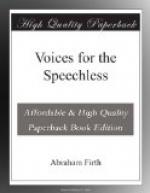By chance it happened that
in Atri dwelt
A knight, with spur on heel
and sword in belt,
Who loved to hunt the wild-boar
in the woods,
Who loved his falcons with
their crimson hoods,
Who loved his hounds and horses,
and all sports
And prodigalities of camps
and courts;—
Loved, or had loved them:
for at last, grown old,
His only passion was the love
of gold.
He sold his horses, sold his
hawks and hounds,
Rented his vineyards and his
garden-grounds,
Kept but one steed, his favorite
steed of all,
To starve and shiver in a
naked stall,
And day by day sat brooding
in his chair,
Devising plans how best to
hoard and spare.
At length he said: “What
is the use or need
To keep at my own cost this
lazy steed,
Eating his head off in my
stables here,
When rents are low and provender
is dear?
Let him go feed upon the public
ways;
I want him only for the holidays.”
So the old steed was turned
into the heat
Of the long, lonely, silent,
shadeless street;
And wandered in suburban lanes
forlorn,
Barked at by dogs, and torn
by brier and thorn.
One afternoon, as in that
sultry clime
It is the custom in the summer-time,
With bolted doors and window-shutters
closed,
The inhabitants of Atri slept
or dozed;
When suddenly upon their senses
fell
The loud alarum of the accusing
bell!
The Syndic started from his
deep repose,
Turned on his couch, and listened,
and then rose
And donned his robes, and
with reluctant pace
Went panting forth into the
market-place,
Where the great bell upon
its cross-beam swung
Reiterating with persistent
tongue,
In half-articulate jargon,
the old song:
“Some one hath done
a wrong, hath done a wrong!”
But ere he reached the belfry’s
light arcade
He saw, or thought he saw,
beneath its shade,
No shape of human form of
woman born,
But a poor steed dejected
and forlorn,
Who with uplifted head and
eager eye
Was tugging at the vines of
briony.
“Domeneddio!”
cried the Syndic straight,
“This is the Knight
of Atri’s steed of state!
He calls for justice, being
sore distressed,
And pleads his cause as loudly
as the best.”
Meanwhile from street and
lane a noisy crowd
Had rolled together like a
summer cloud,
And told the story of the
wretched beast
In five-and-twenty different
ways at least,
With much gesticulation and
appeal
To heathen gods, in their
excessive zeal.
The Knight was called and
questioned; in reply
Did not confess the fact,
did not deny;
Treated the matter as a pleasant
jest,
And set at naught the Syndic
and the rest,
Maintaining, in an angry undertone,
That he should do what pleased
him with his own.




